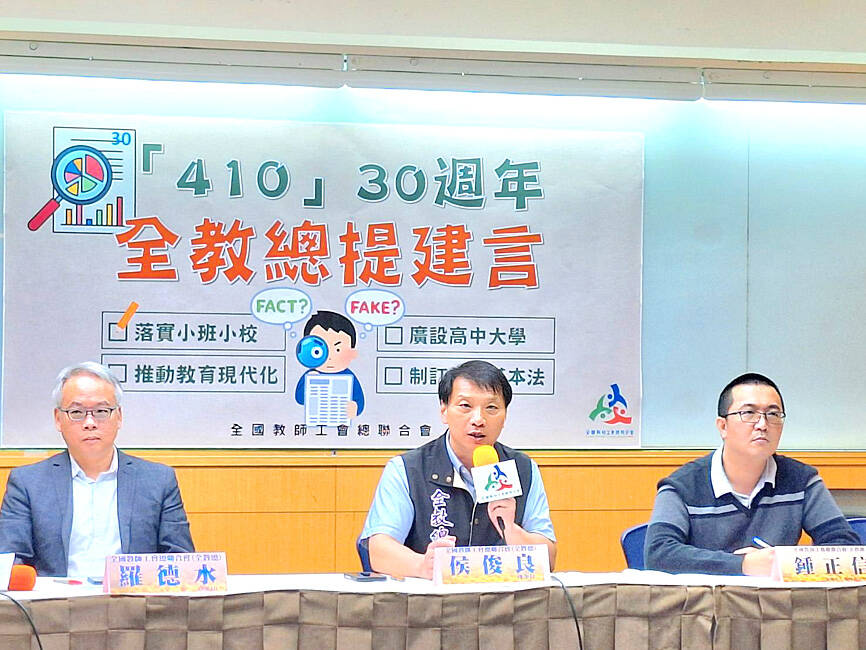More than 10 education groups on Tuesday issued a joint statement urging president-elect William Lai (賴清德) to hold a National Education Conference after his inauguration next month.
The statement referred to the agenda the groups proposed while parties were campaigning for the presidential election and the promises all the candidates made to hold a ninth National Education Conference if elected, reminding Lai of his commitment the day before the 30th anniversary of a demonstration calling for drastic education reform on April 10, 1994.
The eight previous conferences were held by the government in response to domestic and global changes, said Huang Cheng-chieh (黃政傑), who heads the National Academy for Educational Research.

Photo: CNA
It is time to host a ninth conference given the tremendous changes Taiwanese society has undergone since the last one was held in 2010, Huang said.
However, education workers have also called for deeper reflection and changes to the entire system, with many critical of the education reforms led by then-Academia Sinica president Lee Yuan-tseh (李遠哲), Taiwan’s only Nobel laureate, 30 years ago.
At that time, demonstrators called for smaller classes with fewer than 30 students, more high schools and universities, modern teaching methods, and the drafting of an Educational Fundamental Act (教育基本法) to protect people’s right to learn, while establishing guidelines for basic education.
The demonstration led to the seventh National Education Conference two months later, and education reform was embraced, with the act passing in 1999.
National Federation of Teachers’ Unions president Hou Chun-liang (侯俊良) on Tuesday told a news conference that the reforms had largely failed in terms of realizing their stated goals.
While they led to the establishment of a lot more high schools and universities, this did not relieve pressure on students as promised, Hou said, adding that the increase in the number of high schools actually marginalized vocational schools.
High-school classes still have at least 35 students, with up to 45 in private high schools, federation deputy secretary-general Chung Cheng-hsin (鍾正信) said.
Only schools affected by Taiwan’s low birthrate have classes with fewer students, he added.
Citing the closure of many higher education institutions, federation official Lo Te-shui (羅德水) said the reforms had neglected to factor in population growth, adding that Taiwan needs to re-examine how education has developed over the past three decades to avoid making the same mistakes again.
Former minister of education Kuo Wei-fan (郭為藩) said he agreed with calls for a National Education Conference, describing it as a “physical” for the country’s educational system.
Such an event would not only draw public attention to education-related issues, but also allow experts to exchange opinions and draft plans, he added.

The Chinese Communist Party (CCP) is pushing for residents of Kinmen and Lienchiang counties to acquire Chinese ID cards in a bid to “blur national identities,” a source said. The efforts are part of China’s promotion of a “Kinmen-Xiamen twin-city living sphere, including a cross-strait integration pilot zone in China’s Fujian Province,” the source said. “The CCP is already treating residents of these outlying islands as Chinese citizens. It has also intensified its ‘united front’ efforts and infiltration of those islands,” the source said. “There is increasing evidence of espionage in Kinmen, particularly of Taiwanese military personnel being recruited by the

ENTERTAINERS IN CHINA: Taiwanese generally back the government being firm on infiltration and ‘united front’ work,’ the Asia-Pacific Elite Interchange Association said Most people support the government probing Taiwanese entertainers for allegedly “amplifying” the Chinese Communist Party’s propaganda, a survey conducted by the Asia-Pacific Elite Interchange Association showed on Friday. Public support stood at 56.4 percent for action by the Mainland Affairs Council and the Ministry of Culture to enhance scrutiny on Taiwanese performers and artists who have developed careers in China while allegedly adhering to the narrative of Beijing’s propaganda that denigrates or harms Taiwanese sovereignty, the poll showed. Thirty-three percent did not support the action, it showed. The poll showed that 51.5 percent of respondents supported the government’s investigation into Taiwanese who have

Left-Handed Girl (左撇子女孩), a film by Taiwanese director Tsou Shih-ching (鄒時擎) and cowritten by Oscar-winning director Sean Baker, won the Gan Foundation Award for Distribution at the Cannes Critics’ Week on Wednesday. The award, which includes a 20,000 euro (US$22,656) prize, is intended to support the French release of a first or second feature film by a new director. According to Critics’ Week, the prize would go to the film’s French distributor, Le Pacte. "A melodrama full of twists and turns, Left-Handed Girl retraces the daily life of a single mother and her two daughters in Taipei, combining the irresistible charm of

South Korean K-pop girl group Blackpink are to make Kaohsiung the first stop on their Asia tour when they perform at Kaohsiung National Stadium on Oct. 18 and 19, the event organizer said yesterday. The upcoming performances will also make Blackpink the first girl group ever to perform twice at the stadium. It will be the group’s third visit to Taiwan to stage a concert. The last time Blackpink held a concert in the city was in March 2023. Their first concert in Taiwan was on March 3, 2019, at NTSU Arena (Linkou Arena). The group’s 2022-2023 “Born Pink” tour set a